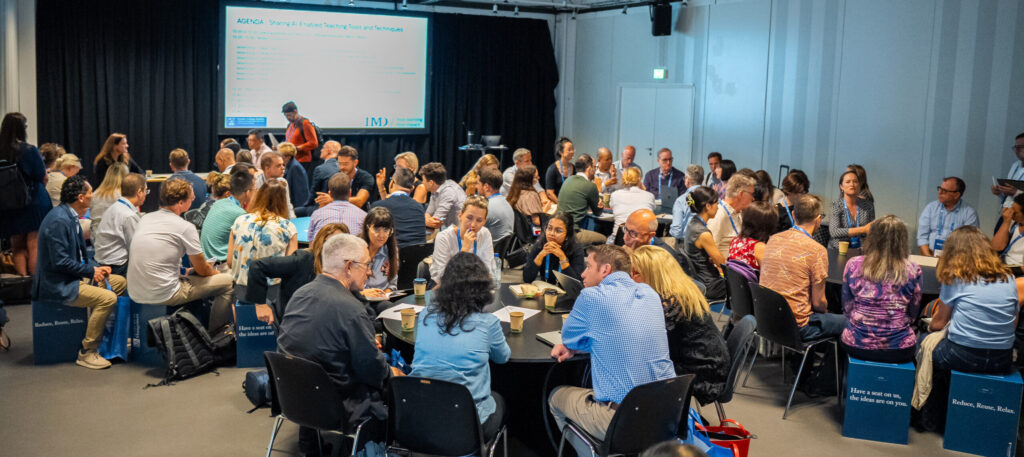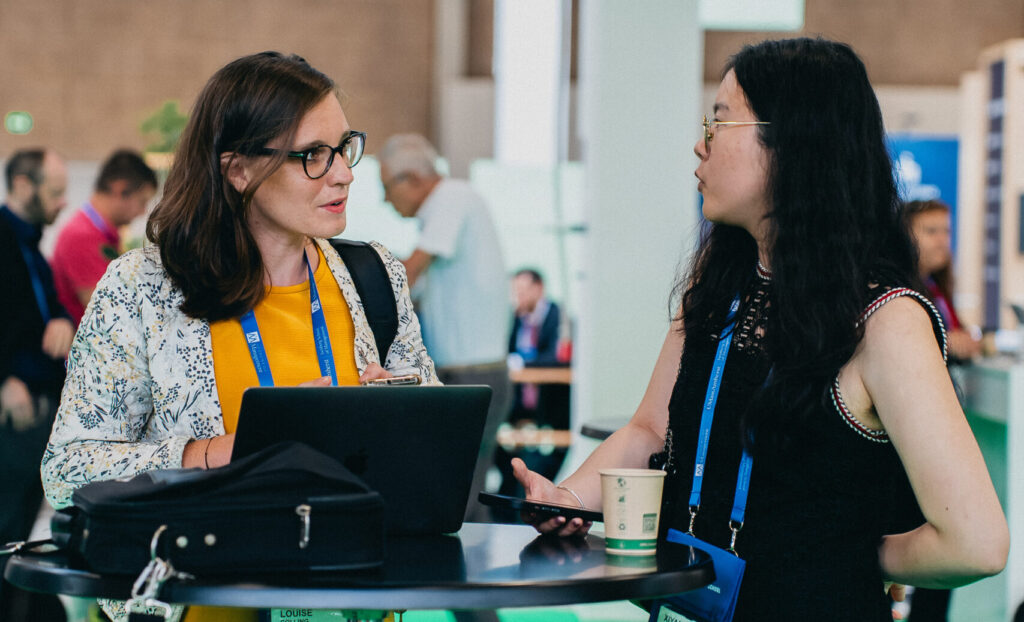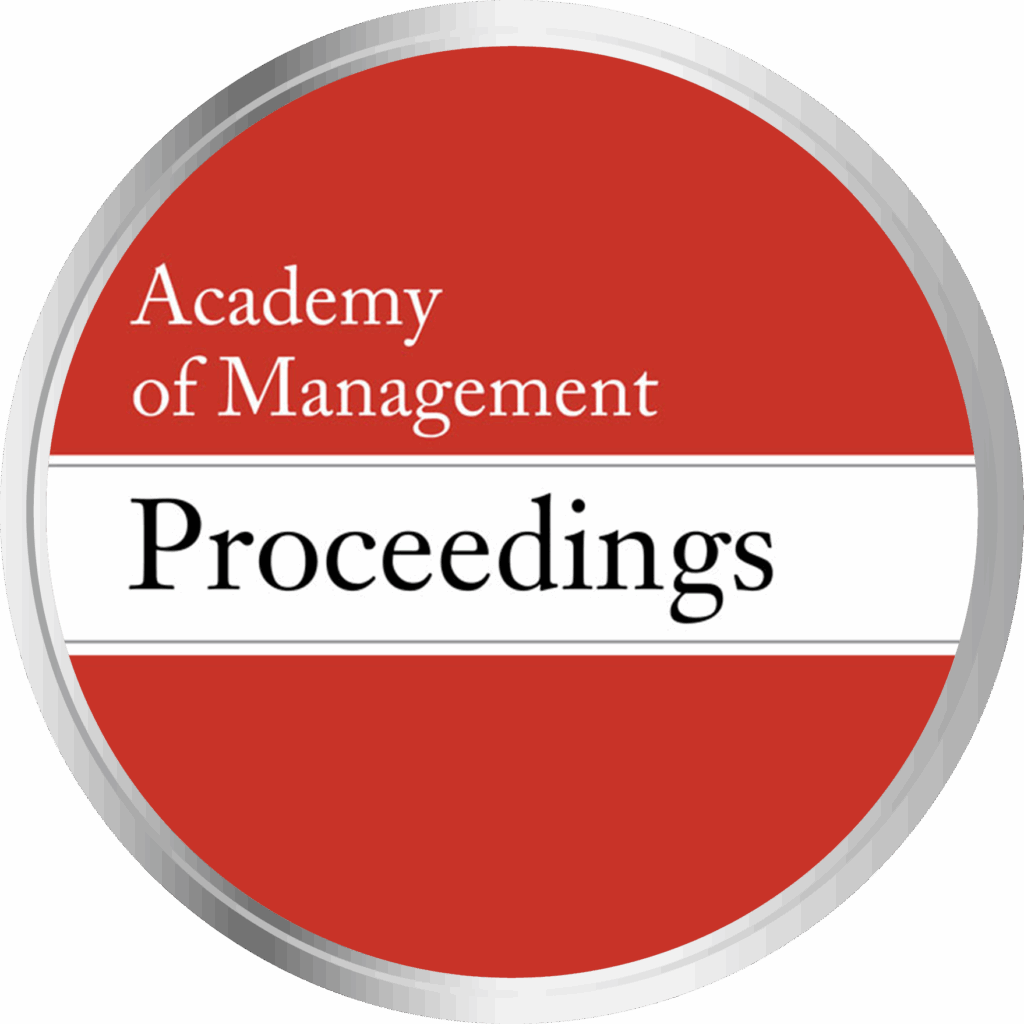Annual Meeting Program
AOM 2026 Program available June 2026
The Annual Meeting program offers something for everyone—view scheduled sessions and events, see who’s listed in the program, and find fellow AOM members who have already registered to attend.

Annual Meeting Session Types
Caucuses provide an opportunity for scholars to innovate, share, and discuss emergent ideas that are still in the incubatory stage. Caucuses are designed to provide participants with opportunities to collaborate, develop new ideas, and explore emerging topics regarding the conference theme in a convenient, informal way to develop a community and spark potential collaborations. Caucuses’ deliberations are an informal exchange with facilitators rather than a designated presenter(s). The organizers typically serve as discussion leaders but do not make a formal presentation.
How Caucuses Differ from Symposia:
- Caucuses do not have a requirement for authored papers. The submissions for a caucus should detail the ideas for discussion and the format planned by the organizers–typically no more than two pages in length.
- Caucuses are more informal for members with shared interests to discuss common issues and explore potential research collaborations, whereas a panel symposium consists of a group of panelists in a formal interactive discussion.
- Caucuses require documented interest from five AOM members including their affiliations and contact information; Symposia require sponsorship by a Division or Interest Group (DIG).
Important Notes
- AOM Membership is not needed to submit a proposal to the Annual Meeting.
- If a proposal is accepted, participants must register to attend the Annual Meeting.
- All participants attending the Annual Meeting must be AOM Members.
- Review the Caucus submission guidelines.
Explore enhanced flexibility through our new submission type—On-Demand Sessions. Accepted submissions will be available on demand via the AOM online platform throughout the 2026 Annual Meeting. This format provides an opportunity to increase the visibility of your research, engage with attendees through chat or discussion forums, review uploaded session materials, and access select recorded onsite sessions.
Eligible Session Types: Papers, Symposium, Professional Development Workshops, Caucus
*When submitting, select on-demand as your presentation format in the Submission Center for one of the eligible session types.
On-Demand Submissions will be reviewed by each Division and Interest Group.
How It Works
- Prepare and Record
- Presenters record a concise version of their presentation (typically 10–15 minutes) following the same content guidelines used for in-person sessions.
- You may use any recording tool you prefer (e.g., Zoom, PowerPoint, or screen-capture software).
- Upload to the Platform
- After acceptance, you’ll receive upload instructions and a link to our submission platform.
- Files must be uploaded by the posted deadline to ensure inclusion in the session program.
- Engage with Viewers
- Registered attendees will be able to view your presentation and post comments or questions.
- Review and Evaluation
- The submission, review, and program placement processes remain unchanged. This is simply an alternate participation format for those who cannot be onsite.
Key Points
- This is not a virtual session or a separate online conference.
- It is a presentation participation option designed to include scholars who cannot travel.
- Your work remains part of the official Annual Meeting program and archive.
- The quality, visibility, and engagement opportunities are consistent with our in-person experience.
Important Notes
- Submitters do not need to be members to submit a proposal to the Annual Meeting.
- If a proposal is accepted, participants must register to attend the Annual Meeting.
- All participants attending the Annual Meeting must be AOM Members.
- Review the On-Demand Session submission guidelines.
View On-Demand session FAQs here.
Paper Sessions
A paper can be submitted to only one Division or Interest Group (DIG). Paper sessions consist of accepted papers grouped together by the DIG Program Chair based upon a common theme reflecting the interests and domains of the DIG. Each paper session consists of three to five papers with a session moderator who handles introductions, time keeping, and guides the content of the session. Each author has a set amount of time to present their work. All paper sessions are scheduled in 90-minute time blocks and will be held in-person from Sunday through Tuesday.
Refereed Scholarly Submissions
Papers and symposia are blind reviewed to help protect the integrity of the submission and review process.
Papers are double-blind reviewed and are evaluated on clarity, analysis, methodological rigor, and overall quality. Double-blind review means that author and submitter information is not known to the reviewers, and reviewer information is not known to the authors or submitter.
Symposia are single-blind reviewed and are judged on overall quality, interest, relevance to the Division or Interest Group (DIG) to which they are submitted, and innovation and contribution. Single-blind review means that author and submitter information is known to the reviewers, but reviewer information is not known to the authors or submitter.
Important Notes
- Submitters do not need to be members to submit a proposal to the Annual Meeting.
- If a proposal is accepted, participants must register to attend the Annual Meeting.
- All participants attending the Annual Meeting must be AOM Members.
- Review the Paper Session submission guidelines.
Symposia
In symposium sessions, several speakers discuss a common topic or theme in a manner that brings new insights to the subject. Symposia can be submitted to up to three Divisions and Interest Groups (DIGs). There are two types of symposia: Panel Symposia and Presenter Symposia. Symposia can be singly sponsored by a DIG, or jointly sponsored by up to three DIGs. All symposium sessions are scheduled in 90-minute time blocks and will be held in-person from Sunday through Tuesday.
Panel Symposia
A panel symposium engages a group of panelists in an interactive discussion. There are no titles associated with the panelists’ presentations. Proposals for panel discussions should include clear descriptions of the topics to be discussed and the procedures that will be used to manage the discussion among panelists and with the audience.
Presenter Symposia
A presenter symposium involves a series of authored papers on a preset theme. In a presenter symposium, titles and authors / presenters are associated with each presentation. A presenter symposium can involve co-authored presentations. Co-authors will be listed on the program.
Showcase Symposia
Showcase symposia should be the very best symposium submissions received and should be expected to attract a large audience. Each DIG Program Chair may designate up to 10% of symposia accepted by their DIG to be designated as showcase symposia.
Poster sessions encourage open dialogue and are a great way for researchers to share their work in a less formal setting compared to traditional presentations while still being an official part of the program. A poster submission includes an extended abstract manuscript that will be reviewed by the selected Division or Interest Group (DIG). If accepted, submitters will be expected to create a poster presentation to be displayed visually that summarizes their research findings, methods, and conclusions. Poster presentations often include graphs, images, and text to make the information clear and engaging, and provide a platform for networking. In this format, presenters will have an opportunity to receive immediate feedback on their work. A poster submission (extended abstract) can only be submitted to one DIG.
Poster Submissions will be reviewed by each Division and Interest Group that accepts poster submissions.
Important Notes
- Submitters do not need to be members to submit a proposal to the Annual Meeting.
- If a proposal is accepted, participants must register to attend the Annual Meeting.
- All participants attending the Annual Meeting must be AOM Members.
- Review the Poster Session submission guidelines.
Professional Development Workshops (PDWs) include a wide variety of session formats and learning experiences led by experts in the topic with intended takeaways for the participants. They include doctoral consortia and junior faculty consortia that are organized by AOM’s Division and Interest Groups (DIGs) and Affiliates who have designated PDW Chairs to manage the session selection procedure. Workshops can take various forms, such as tutorials, town hall meetings, breakout sessions, debates, roundtables, tours or research incubators. All PDWs contain a clear interactive component. Proposals will be evaluated on their ability to draw an audience from the specific discipline or across AOM, as well as its innovativeness and potential impact on the professional success of participants. PDW’s including consortia will be held in-person from Friday through Sunday.
Before submitting a PDW proposal, consider the following questions:
- Does the workshop offer a high quality and high level learning experience that has a significant positive impact on the professional development of the participants?
- Does the workshop provide participants with a clear takeaway? (E.g. learn a new skill; develop a new research plan)
- Does the workshop have a theme and a group of participants that will draw a strong audience regardless of competing sessions or scheduling restrictions?
- Does the workshop encourage multi-way conversation and interaction among participants from multiple divisions, disciplines, regions, career stages, or demographic backgrounds?
- Is the workshop creative and innovative in all of its elements?
William L. Dougan of the University of Wisconsin-Whitewater has provided an additional resource in the form of A Guide for Creating and Managing a Good Professional Development Workshop.
Important Notes
- Submitters do not need to be members to submit a proposal to the Annual Meeting.
- If a proposal is accepted, participants must register to attend the Annual Meeting.
- All participants attending the Annual Meeting must be AOM Members.
- Review the Professional Development Workshop submission guidelines.
READY FOR AOM 2026?
AOM 2026 Review Center is open!
Volunteer to review submissions.
Event Volunteers and Contacts
Listing of 2026 Annual Meeting program organizers, DIG scholarly/PDW program chairs, and affiliate program volunteers.


Annual Meeting Proceedings and Best Papers
Proceedings includes the abstracts of all accepted papers and symposia as well as abridged versions of the program’s “Best Papers” (top 10%) as designated by the Division and Interest Group (DIG) Program Chairs.
